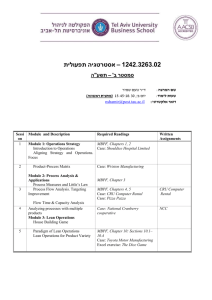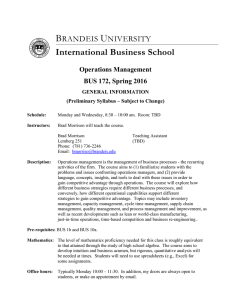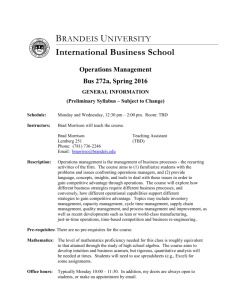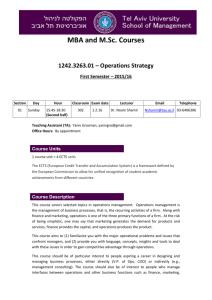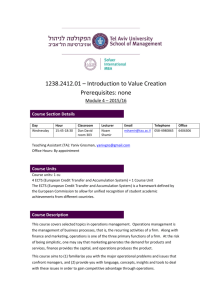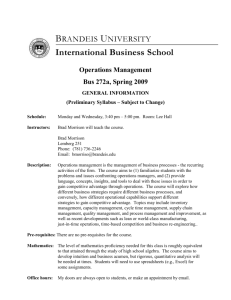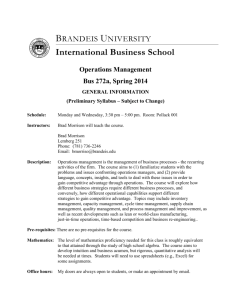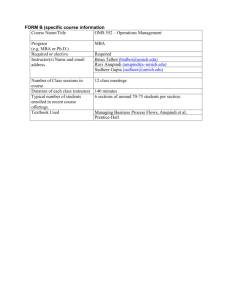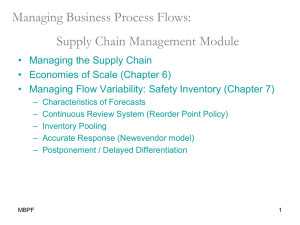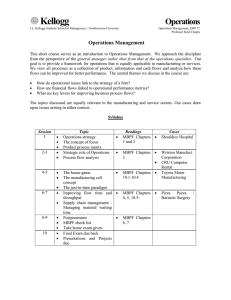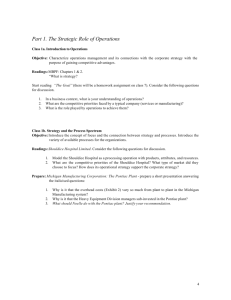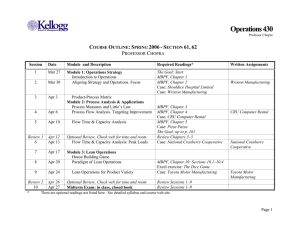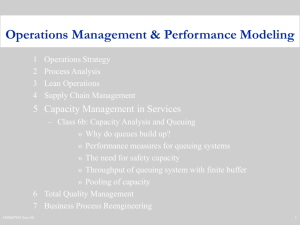OPNS 430 Course Syllabus
advertisement
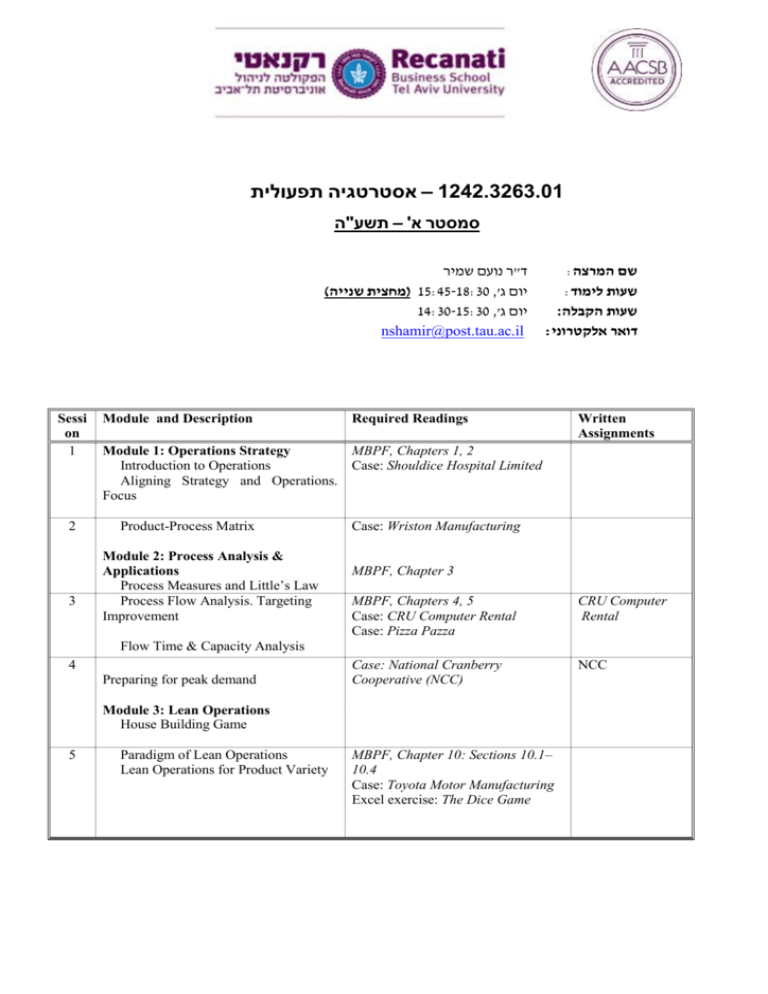
– אסטרטגיה תפעולית1242.3263.01 סמסטר א' – תשע"ה ד"ר נועם שמיר ) (מחצית שנייה15:45-18:30 ,'יום ג 14:30-15:30 ,'יום ג nshamir@post.tau.ac.il Sessi on 1 2 3 Module and Description :שם המרצה :שעות לימוד :שעות הקבלה :דואר אלקטרוני Required Readings Written Assignments MBPF, Chapters 1, 2 Module 1: Operations Strategy Introduction to Operations Case: Shouldice Hospital Limited Aligning Strategy and Operations. Focus Product-Process Matrix Module 2: Process Analysis & Applications Process Measures and Little’s Law Process Flow Analysis. Targeting Improvement Case: Wriston Manufacturing MBPF, Chapter 3 MBPF, Chapters 4, 5 Case: CRU Computer Rental Case: Pizza Pazza CRU Computer Rental Case: National Cranberry Cooperative (NCC) NCC Flow Time & Capacity Analysis 4 Preparing for peak demand Module 3: Lean Operations House Building Game 5 Paradigm of Lean Operations Lean Operations for Product Variety MBPF, Chapter 10: Sections 10.1– 10.4 Case: Toyota Motor Manufacturing Excel exercise: The Dice Game Operations Strategy Sessi on 6 7 Shamir Module and Description Required Readings Module 4: Service Operations Management Capacity, Queueing and Flow Time Analysis Evaluation of service systems Design of service systems (Pooling vs. Segregation, Specialization vs. Flexibility) Priority (Fast Track) The impact of limited buffers MBPF: Chapter 8. Case: The BAT case Module 5: Supply Chain Management Inventory Basics Optimal Service Level Economies of Scale MBPF, Chapter 7: Section 7.3 Case: Palü Gear MBPF, Chapter 6 * Written Assignments The BAT case There are optional readings not listed here. See detailed syllabus and course web site. 2 Operations Strategy Shamir 1. Course Description and Objectives This course covers selected topics in operations management. Operations management is the management of business processes, that is, the recurring activities of a firm. Along with finance and marketing, operations is one of the three primary functions of a firm. At the risk of being simplistic, one may say that marketing generates the demand for products and services, finance provides the capital, and operations produces the product. This course aims to (1) familiarize you with the major operational problems and issues that confront managers, and (2) provide you with language, concepts, insights and tools to deal with these issues in order to gain competitive advantage through operations. This course should be of particular interest to people aspiring a career in designing and managing business processes, either directly (V.P. of Ops, COO) or indirectly (e.g., management consulting). The course should also be of interest to people who manage interfaces between operations and other business functions such as finance, marketing, managerial accounting and human resources. Finally, a working knowledge of operations, which typically employs the greatest number of employees and requires the largest investment in assets, is indispensable for general managers and entrepreneurs. We will see how different business strategies require different business processes, and vice versa, how different operational capabilities allow and support different strategies to gain competitive advantage. A process view of operations will be used to analyze different key operational dimensions such as capacity management, flow time management, supply chain management, and quality management. We will also discuss developments such as lean operations and just-in-time operations. 2. Required Texts Slides will be made available a week before the first class. 1. Course pack: cases. 2. Managing Business Process Flows: Principles of Operations Management (MBPF) by Anupindi, Chopra, Deshmukh, Van Mieghem and Zemel. Prentice Hall, (any edition will be fine) 3 Operations Strategy Shamir 3. Grading The grade you receive for the course is intended to certify your demonstrated proficiency in the course material. Proficiency will be estimated by measuring your performance on (1) class contribution, (2) homeworks and (3) exam. The final exam will be an in-class exam with open readings, open class handouts and notes. It will be comprehensive, covering material from all course modules. Your course grade will be based on a weighted evaluation of the following categories: 1. Class contribution 2. Case write-ups 3. Final examination 10% 30% 60% The school has a policy of maintaining the same average grade across different courses (except for courses with low enrolment rate). According to this policy, the average grade in this course will be between 78 and 82. 4. Preparing for Class Course assignments are designed to engage you in the issues, to teach you ways to think about and analyze operational problems, and to prepare you to be effective managers. The enclosed course outline and detailed schedule provides you, class by class, with a brief description of the class, the readings and case preparation questions (if any). 5. Case Team Write-up Assignments The case write-ups are to be done in teams. The goal of the team approach to case prep is to have you think and experiment while sensitizing you to those issues that are novel and that will be further discussed in class. Each case write-up should address the questions indicated in the detailed class schedule below. In preparing your write-up, please adhere to the following guidelines: Be concise and well-structured: Recommendations should be summarized on the first page and be complemented by a crystal clear discussion on how these follow from your analysis. Your write up should not exceed 2 pages of text (11pt, 1 ½ lines spaced), not including exhibits. (Remember: 2 pages is a limit, not a quota.) Be to the point: Know that you write to someone who knows the facts of the case; focus on your explaining – and making a clear case for – your recommendations. Be punctual: Late submissions will not be accepted. 4 Operations Strategy Shamir 6. Class Contribution In-class contribution will consist mainly of voluntary contributions, although I may call upon students to encourage broader participation. 7. Suggested Readings None of these readings are a requirement for the course. Nonetheless, you may find them interesting. 1. The Machine that Changed the World: The Story of Lean Production by James P. Womack, Daniel T. Jones and Daniel Roos, Harper Perennial, 1991. 2. Chasing The Rabbit: How Market Leaders Outdistance the Competition and How Great Companies Can Catch Up and Win, by Steven Spear, McGraw-Hill, 2008. 3. Call Center Management on Fast Forward: Succeeding in Today's Dynamic Customer Contact Environment by Brad Cleveland, ICMI Press, 2006. 4. Matching Supply with Demand: An Introduction to Operations Management by Gerard Cachon and Christian Terwiesch, McGraw-Hill/Irwin; 2 edition 2008. 5. Supply Chain Management (4th ed) by S.C. Chopra and P. Meindl, Prentice Hall, 2009. 6. Operations Strategy: Principles and Practice by J.A. Van Mieghem, Dynamic Ideas, 2008. Final exam In preparing for the final, I suggest that you review the sample final (available on the class web site) and MBPF examples and exercises (solutions are available on the class web site). This exam will be an in-class exam with open readings, open class handouts and open class notes. 5
